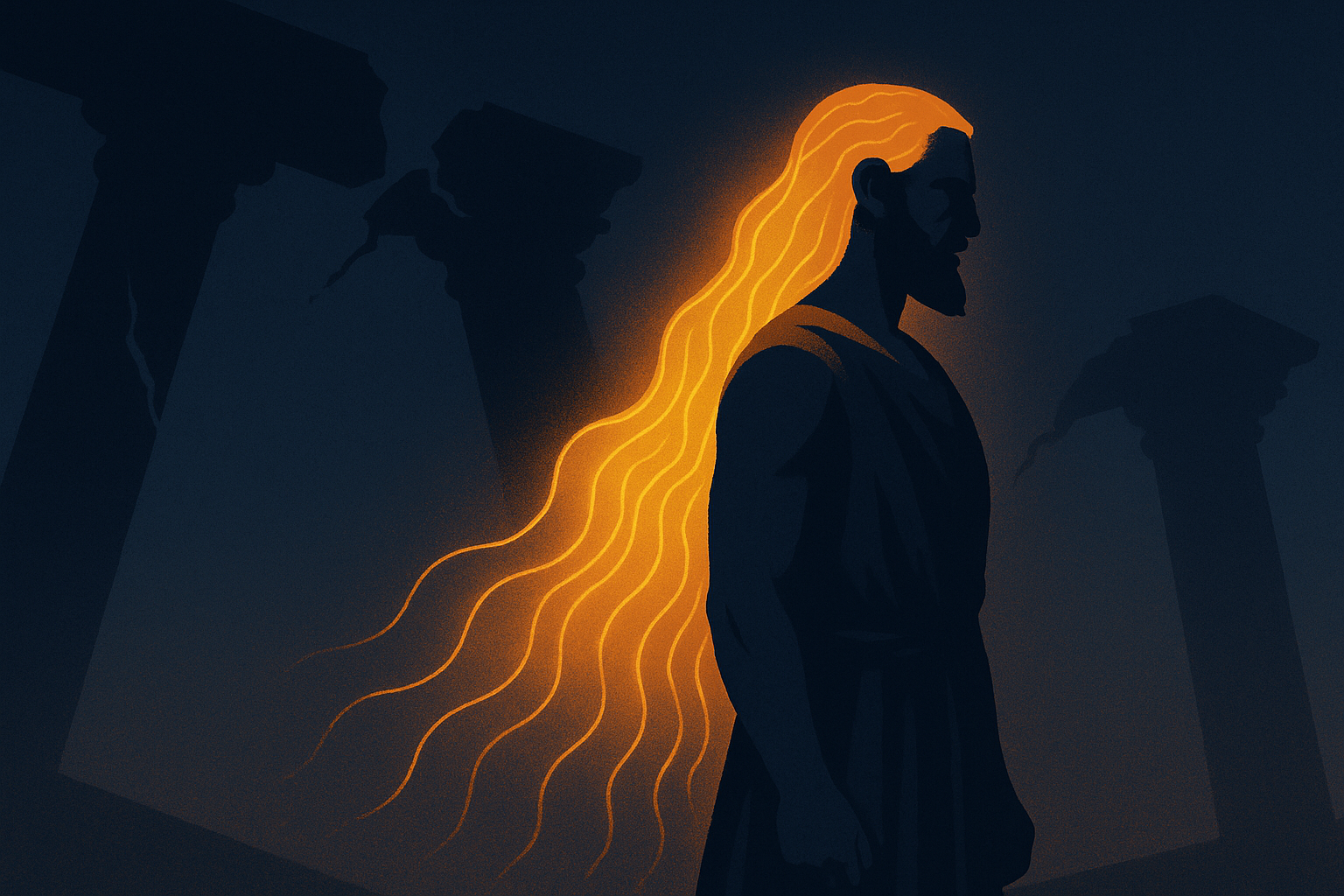Samson and the Hair of Power: The Covenant Between Body and Spirit
1. The Biblical Narrative (Judges 13–16)
Birth and Vow
Samson’s story begins with a prophecy. An angel appears to his barren mother, declaring that her son will be a Nazirite, dedicated to God from birth. The Nazirite vow forbids three things: drinking wine, touching the unclean, and cutting one’s hair.
His uncut hair becomes a visible sign of divine covenant — a sacred bond between spirit and body.
“For behold, you shall conceive and bear a son. No razor shall come upon his head, for the child shall be a Nazirite to God from the womb.”
— Judges 13:5
Strength and Calling
Samson’s uncut hair becomes the symbol through which divine power flows. He kills a lion bare-handed, defeats armies, and judges Israel for twenty years.
His strength, however, is not muscle but alignment — the coherence between divine will and personal conduct.
Temptation and Betrayal
Enter Delilah, a Philistine woman he loves. She is bribed to discover the source of his power. After repeated questioning, Samson confesses that his strength resides in his hair — the sign of his vow.
As he sleeps, Delilah cuts his hair. His covenant is broken; his power departs. He is captured, blinded, and enslaved.
“If my head were shaved, my strength would leave me, and I would become as weak as any other man.”
— Judges 16:17
Humiliation and Redemption
Blinded, Samson becomes a tragic figure — a fallen vessel. Yet in captivity, his hair begins to grow again, and with it, his inner sight.
In the temple of Dagon, surrounded by enemies, he prays for one last surge of divine strength — to bring the pillars down, fulfilling his destiny through sacrifice.
“O Lord God, remember me, I pray thee, and strengthen me only this once.”
— Judges 16:28
2. Psychological and Symbolic Dimensions
Hair as Covenant and Identity
Hair here is not magical; it is symbolic integrity.
It represents the alignment between inner devotion and outward form — between what one is and what one appears to be.
To cut the hair is to sever the thread that binds self and spirit.
Delilah as the Shadow
Delilah embodies the shadow aspect of desire — the seductive voice that tempts us to trade authenticity for attachment.
Her question is timeless: Where does your strength truly lie?
In appearance, or in the invisible covenant of the soul?
Blindness as Revelation
When Samson loses physical sight, he gains inner vision.
Stripped of pride and power, he sees that strength is not possessed but channeled.
His final act — self-sacrifice — transforms brute force into spiritual surrender.
3. Metaphysical Reading
Hair as Antenna of Spirit
In metaphysical traditions, hair symbolizes energy transmission — an extension of life force.
Letting it grow signifies openness to divine flow; cutting it marks disconnection.
Samson’s hair thus represents the etheric bridge between heaven and earth, between divine intent and human vessel.
The Cycle of Power
Samson’s life follows the archetypal rhythm:
- Consecration — Born with divine purpose.
- Corruption — Distracted by desire.
- Confrontation — Brought to humility.
- Completion — Redeemed through surrender.
It is the eternal pattern of fall and return — the evolution from egoic might to sacred strength.
4. Contemporary Reflection
In our modern age, Samson’s hair may symbolize authentic power — that which arises from integrity, not image.
When we allow the world to “cut” our inner hair — through conformity, fear, or distraction — we lose sight of our true strength.
But when we let it grow again — when we realign with purpose — we regain the current of divine energy flowing through being.
5. Final Insight
Samson’s hair is the thread of consciousness itself — fragile yet luminous.
To guard it is to remember who we are beneath the noise: beings whose strength comes not from control, but from communion.
“As the hair grows back, so too does the memory of who we were before the fall — and who we can become again.”
— Ekelola Reflections

Leave a Reply